

SUBSCRIBE TO OUR FREE NEWSLETTER
Daily news & progressive opinion—funded by the people, not the corporations—delivered straight to your inbox.
5
#000000
#FFFFFF
To donate by check, phone, or other method, see our More Ways to Give page.


Daily news & progressive opinion—funded by the people, not the corporations—delivered straight to your inbox.

In a comparison with nineteen other OECD countries,thought to be our peers, it is clear that it is the United States that has some serious catching up to do. Now, writes Speth, it is time for the nation to decide what it wants to be, where it wants to go, and--importantly--how to get there. (Image: Common Dreams/cc)
With Democratic candidates for president coming forward and progressives nationwide defining the agenda ahead, this is a good time to look hard at where we are as a country. Abraham Lincoln put it best: "If we could first know where we are... we could better judge what to do and how to do it."
So where are we? There are many ways to judge, but one important way is to compare ourselves to other advanced democracies and see where we stand in the rankings. Let's focus on twenty well-to-do countries, all members of the Organization for Economic Cooperation and Development (OECD). In addition to the U.S., the group includes the fifteen major countries of Western Europe, Japan, Australia, New Zealand, and Canada.
Surely it is time to think clearly about how we arrived at this place, and what it means when huge problems arise and persist across almost the whole spectrum of national life. Now it is time to decide "what to do and how to do it."
Next, we need to know which rankings are important. People have different aspirations for the U.S., as we know all too well. The information presented below seeks to bypass abstractions like the overall economy and look instead at the situation facing actual people. To this end, it looks at U.S. performance in the areas of social welfare and economic security, environment and climate, health and well-being, education, gender rights and women, and democratic governance.
Theses realities deserve our most serious attention and links to all the referenced data are included for further exploration. These measures of our current situation--this "People's State of the Nation" as it were--point to where American efforts must be. Even a few minutes with your head bowed over this material--which shows the U.S. woefully behind our peer countries--should convince you that we have let our national situation deteriorate for far too long. The following statistics show the United States is at the very bottom in treatment of women, treatment of children, environmental performance, and many key measures of social and economic well-being, including poverty, inequality, and longevity. No wonder Americans are frustrated and angry.
We now face a daunting, festering array of challenges that were decades in the making. These are issues that deeply afflict our lives and living, and will require the most determined and sustained policy response if we are to save ourselves and help others abroad facing even more dire prospects.
Many aspects of our national condition cannot be adequately captured in international comparisons, for example the special burdens across almost all issues faced by blacks and other minorities in America. The same is true for many international issues, like troops of some variety on the ground today in an estimated 149 of the world's 195 countries.
If we fail to come together to address these challenges, we will remain mired in desperate needs, split by deep divisions, and endlessly burdened and diverted by the cumulative consequences of global warming.
Surely it is time to think clearly about how we arrived at this place, and what it means when huge problems arise and persist across almost the whole spectrum of national life. Now it is time to decide "what to do and how to do it."
We know what is at stake on individual issues explored below, like the treatment of children. But, on a larger canvas, what is also at stake is the success of our experiment in nationhood. If we fail to come together to address these challenges, we will remain mired in desperate needs, split by deep divisions, and endlessly burdened and diverted by the cumulative consequences of global warming.
A look at the numbers
The United States is a rich nation by conventional measures. "The world's highest standard of living" was once frequently heard. The United States is indeed first in average household income per capita, but we fall to sixth in median household income. Getting closer to the heart of the matter, the U.S. falls to thirteenth on the United Nations' Human Development Index,which looks at education and longevity as well as purchasing power. When we examine the detailed conditions of life and living in America, our sad situation is more fully revealed. In a comparison with nineteen other OECD countries,thought to be our peers, recent studies indicate that the United States now has:
In Economic Well-Being
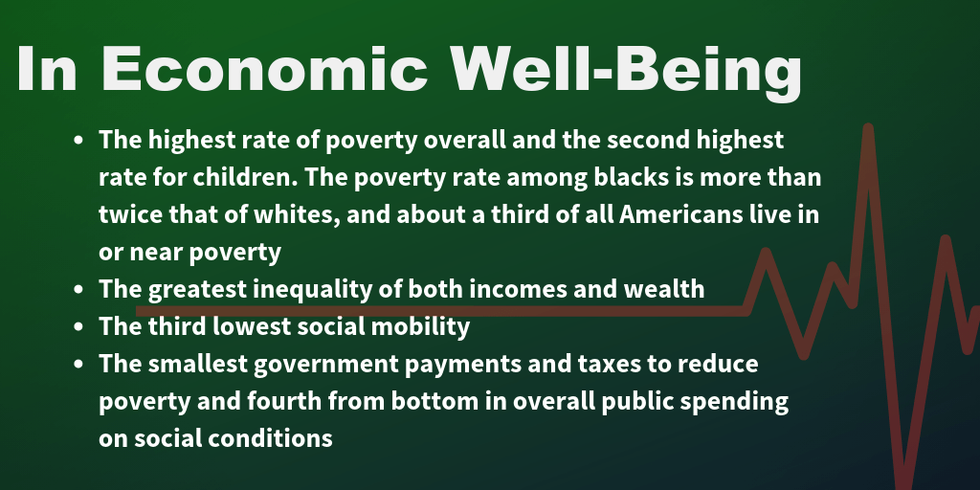
References:
In Gender and Women's Issues
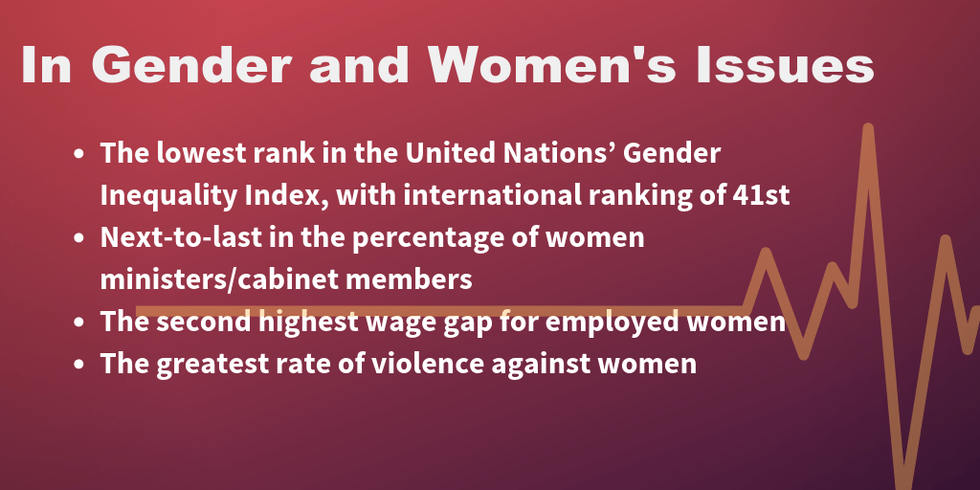
References:
In Social Well-Being
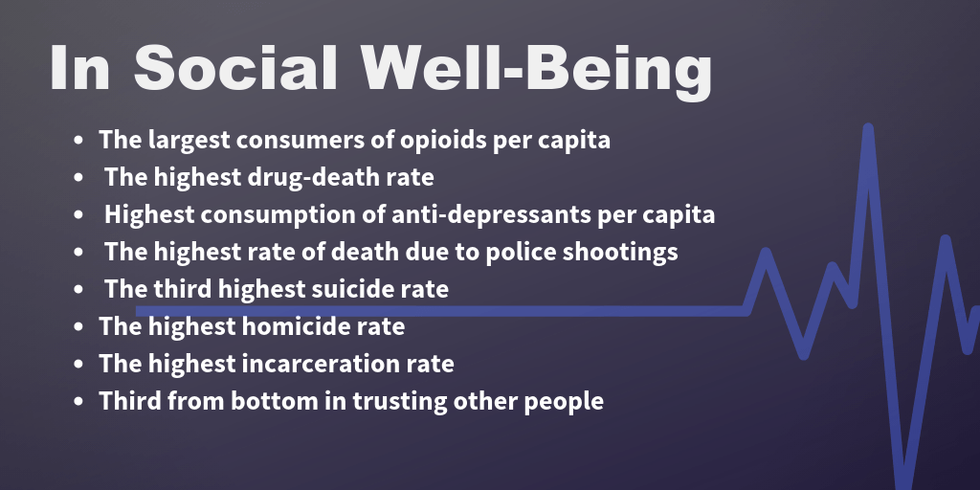
References:
In Environmental Protection
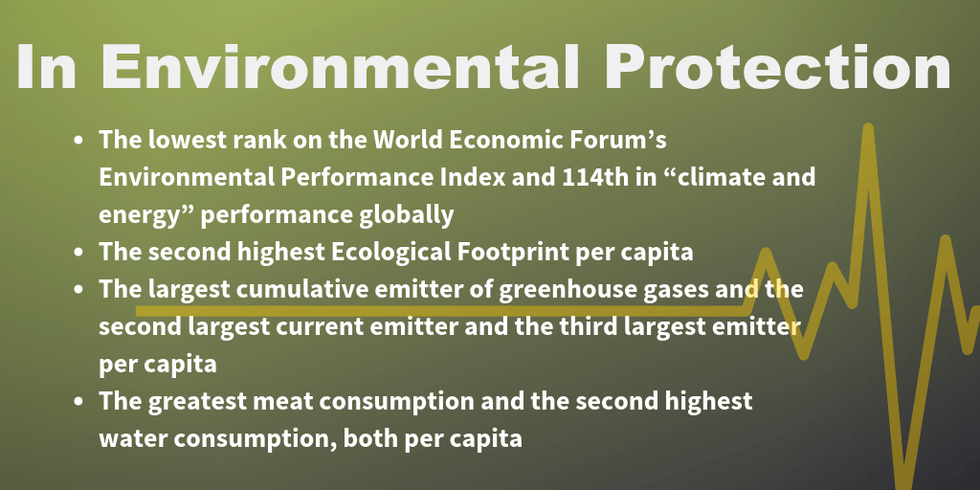
References:
In Child Welfare and Education
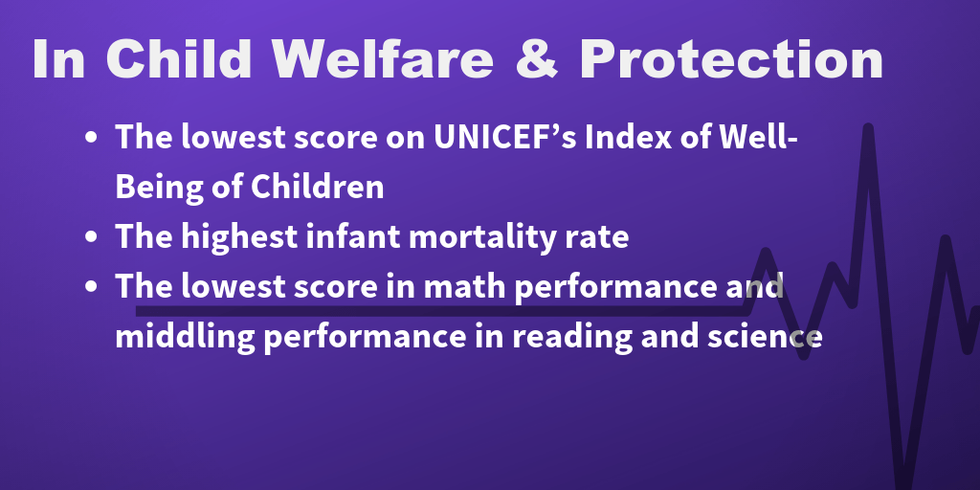
References:
In Health and Health Care
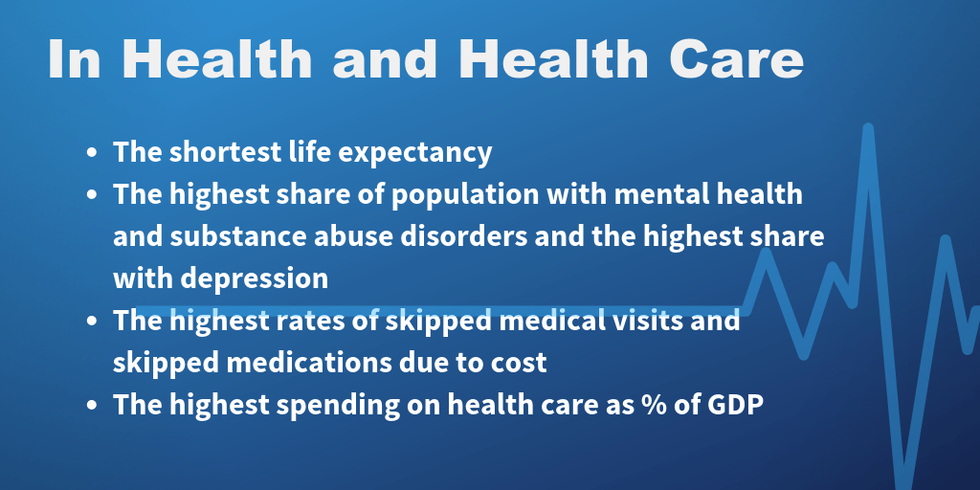
References:
In Governance
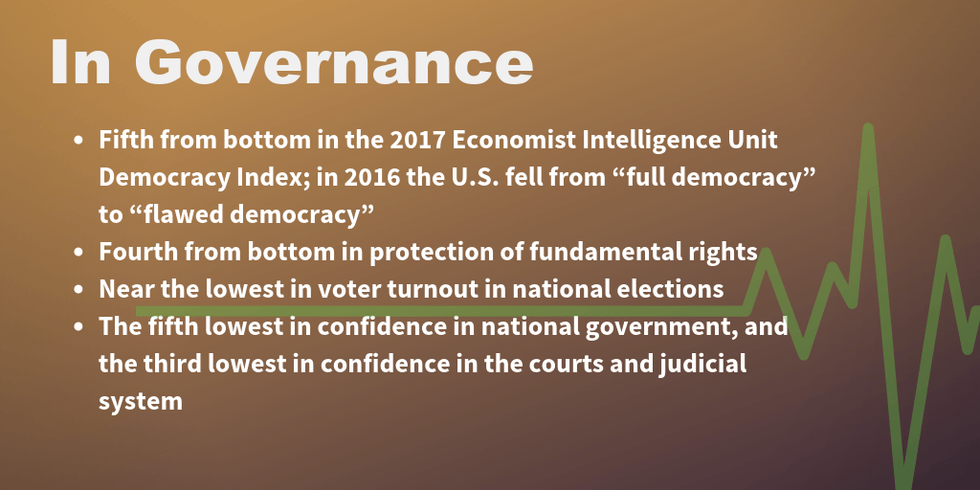
References:
In International Affairs
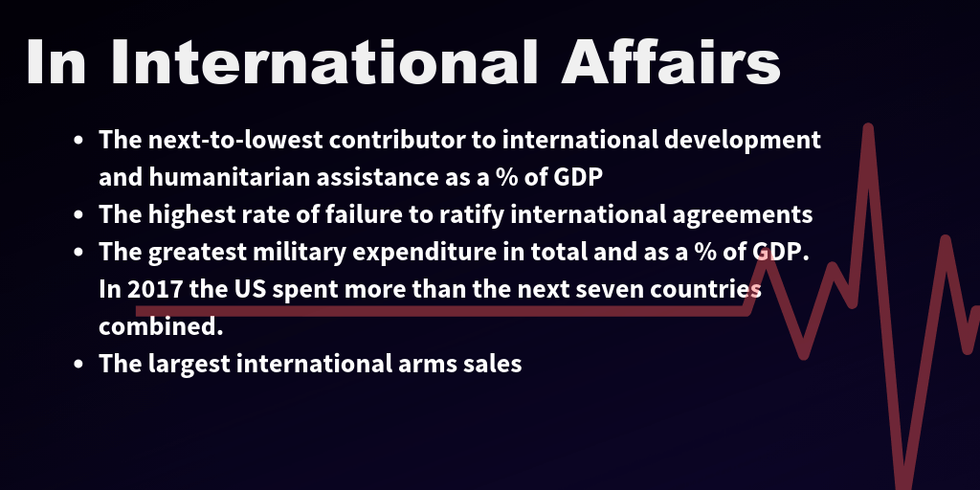
References:
Sarah Baehr and Conor Ploeger, both associated with the Vermont Law School, assisted with the research and preparation of these data sets.
Trump and Musk are on an unconstitutional rampage, aiming for virtually every corner of the federal government. These two right-wing billionaires are targeting nurses, scientists, teachers, daycare providers, judges, veterans, air traffic controllers, and nuclear safety inspectors. No one is safe. The food stamps program, Social Security, Medicare, and Medicaid are next. It’s an unprecedented disaster and a five-alarm fire, but there will be a reckoning. The people did not vote for this. The American people do not want this dystopian hellscape that hides behind claims of “efficiency.” Still, in reality, it is all a giveaway to corporate interests and the libertarian dreams of far-right oligarchs like Musk. Common Dreams is playing a vital role by reporting day and night on this orgy of corruption and greed, as well as what everyday people can do to organize and fight back. As a people-powered nonprofit news outlet, we cover issues the corporate media never will, but we can only continue with our readers’ support. |
With Democratic candidates for president coming forward and progressives nationwide defining the agenda ahead, this is a good time to look hard at where we are as a country. Abraham Lincoln put it best: "If we could first know where we are... we could better judge what to do and how to do it."
So where are we? There are many ways to judge, but one important way is to compare ourselves to other advanced democracies and see where we stand in the rankings. Let's focus on twenty well-to-do countries, all members of the Organization for Economic Cooperation and Development (OECD). In addition to the U.S., the group includes the fifteen major countries of Western Europe, Japan, Australia, New Zealand, and Canada.
Surely it is time to think clearly about how we arrived at this place, and what it means when huge problems arise and persist across almost the whole spectrum of national life. Now it is time to decide "what to do and how to do it."
Next, we need to know which rankings are important. People have different aspirations for the U.S., as we know all too well. The information presented below seeks to bypass abstractions like the overall economy and look instead at the situation facing actual people. To this end, it looks at U.S. performance in the areas of social welfare and economic security, environment and climate, health and well-being, education, gender rights and women, and democratic governance.
Theses realities deserve our most serious attention and links to all the referenced data are included for further exploration. These measures of our current situation--this "People's State of the Nation" as it were--point to where American efforts must be. Even a few minutes with your head bowed over this material--which shows the U.S. woefully behind our peer countries--should convince you that we have let our national situation deteriorate for far too long. The following statistics show the United States is at the very bottom in treatment of women, treatment of children, environmental performance, and many key measures of social and economic well-being, including poverty, inequality, and longevity. No wonder Americans are frustrated and angry.
We now face a daunting, festering array of challenges that were decades in the making. These are issues that deeply afflict our lives and living, and will require the most determined and sustained policy response if we are to save ourselves and help others abroad facing even more dire prospects.
Many aspects of our national condition cannot be adequately captured in international comparisons, for example the special burdens across almost all issues faced by blacks and other minorities in America. The same is true for many international issues, like troops of some variety on the ground today in an estimated 149 of the world's 195 countries.
If we fail to come together to address these challenges, we will remain mired in desperate needs, split by deep divisions, and endlessly burdened and diverted by the cumulative consequences of global warming.
Surely it is time to think clearly about how we arrived at this place, and what it means when huge problems arise and persist across almost the whole spectrum of national life. Now it is time to decide "what to do and how to do it."
We know what is at stake on individual issues explored below, like the treatment of children. But, on a larger canvas, what is also at stake is the success of our experiment in nationhood. If we fail to come together to address these challenges, we will remain mired in desperate needs, split by deep divisions, and endlessly burdened and diverted by the cumulative consequences of global warming.
A look at the numbers
The United States is a rich nation by conventional measures. "The world's highest standard of living" was once frequently heard. The United States is indeed first in average household income per capita, but we fall to sixth in median household income. Getting closer to the heart of the matter, the U.S. falls to thirteenth on the United Nations' Human Development Index,which looks at education and longevity as well as purchasing power. When we examine the detailed conditions of life and living in America, our sad situation is more fully revealed. In a comparison with nineteen other OECD countries,thought to be our peers, recent studies indicate that the United States now has:
In Economic Well-Being

References:
In Gender and Women's Issues

References:
In Social Well-Being

References:
In Environmental Protection

References:
In Child Welfare and Education

References:
In Health and Health Care

References:
In Governance

References:
In International Affairs

References:
Sarah Baehr and Conor Ploeger, both associated with the Vermont Law School, assisted with the research and preparation of these data sets.
With Democratic candidates for president coming forward and progressives nationwide defining the agenda ahead, this is a good time to look hard at where we are as a country. Abraham Lincoln put it best: "If we could first know where we are... we could better judge what to do and how to do it."
So where are we? There are many ways to judge, but one important way is to compare ourselves to other advanced democracies and see where we stand in the rankings. Let's focus on twenty well-to-do countries, all members of the Organization for Economic Cooperation and Development (OECD). In addition to the U.S., the group includes the fifteen major countries of Western Europe, Japan, Australia, New Zealand, and Canada.
Surely it is time to think clearly about how we arrived at this place, and what it means when huge problems arise and persist across almost the whole spectrum of national life. Now it is time to decide "what to do and how to do it."
Next, we need to know which rankings are important. People have different aspirations for the U.S., as we know all too well. The information presented below seeks to bypass abstractions like the overall economy and look instead at the situation facing actual people. To this end, it looks at U.S. performance in the areas of social welfare and economic security, environment and climate, health and well-being, education, gender rights and women, and democratic governance.
Theses realities deserve our most serious attention and links to all the referenced data are included for further exploration. These measures of our current situation--this "People's State of the Nation" as it were--point to where American efforts must be. Even a few minutes with your head bowed over this material--which shows the U.S. woefully behind our peer countries--should convince you that we have let our national situation deteriorate for far too long. The following statistics show the United States is at the very bottom in treatment of women, treatment of children, environmental performance, and many key measures of social and economic well-being, including poverty, inequality, and longevity. No wonder Americans are frustrated and angry.
We now face a daunting, festering array of challenges that were decades in the making. These are issues that deeply afflict our lives and living, and will require the most determined and sustained policy response if we are to save ourselves and help others abroad facing even more dire prospects.
Many aspects of our national condition cannot be adequately captured in international comparisons, for example the special burdens across almost all issues faced by blacks and other minorities in America. The same is true for many international issues, like troops of some variety on the ground today in an estimated 149 of the world's 195 countries.
If we fail to come together to address these challenges, we will remain mired in desperate needs, split by deep divisions, and endlessly burdened and diverted by the cumulative consequences of global warming.
Surely it is time to think clearly about how we arrived at this place, and what it means when huge problems arise and persist across almost the whole spectrum of national life. Now it is time to decide "what to do and how to do it."
We know what is at stake on individual issues explored below, like the treatment of children. But, on a larger canvas, what is also at stake is the success of our experiment in nationhood. If we fail to come together to address these challenges, we will remain mired in desperate needs, split by deep divisions, and endlessly burdened and diverted by the cumulative consequences of global warming.
A look at the numbers
The United States is a rich nation by conventional measures. "The world's highest standard of living" was once frequently heard. The United States is indeed first in average household income per capita, but we fall to sixth in median household income. Getting closer to the heart of the matter, the U.S. falls to thirteenth on the United Nations' Human Development Index,which looks at education and longevity as well as purchasing power. When we examine the detailed conditions of life and living in America, our sad situation is more fully revealed. In a comparison with nineteen other OECD countries,thought to be our peers, recent studies indicate that the United States now has:
In Economic Well-Being

References:
In Gender and Women's Issues

References:
In Social Well-Being

References:
In Environmental Protection

References:
In Child Welfare and Education

References:
In Health and Health Care

References:
In Governance

References:
In International Affairs

References:
Sarah Baehr and Conor Ploeger, both associated with the Vermont Law School, assisted with the research and preparation of these data sets.